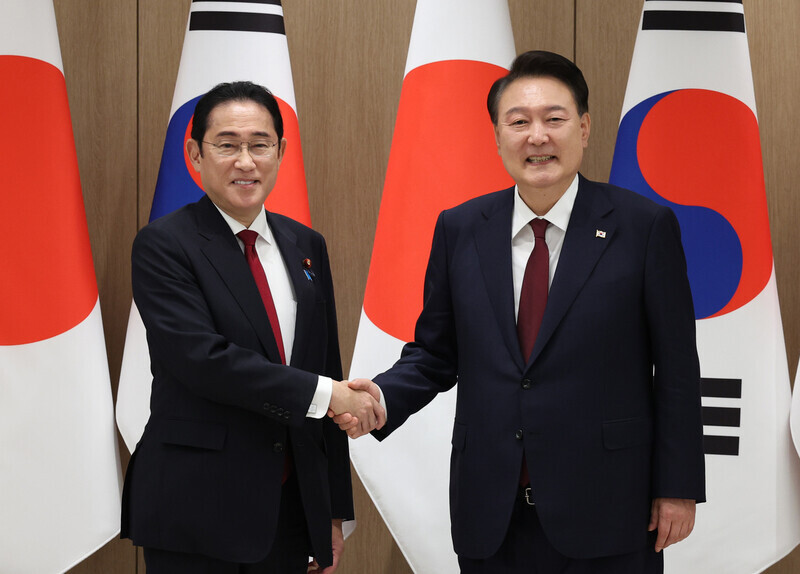hankyoreh
Links to other country sites 다른 나라 사이트 링크
[Column] The tragedy of Korea’s perpetually self-sabotaging diplomacy with Japan


By Hannes Mosler, professor of Korean Politics and Society at the University of Duisburg-Essen
In German universities, lectures on the history of South Korean politics are intriguing to professors and students alike, since conflicts and tensions borne from the contemporaneity of the non-contemporary prompted by South Korea’s compressed modernization excite the entire classroom. This is particularly noticeable when discussing the relations between South Korea and Japan.
Students first are moved to learn that, right before Japan annexed Korea, Emperor Gojong sent secret emissaries to the Second Peace Conference at The Hague in 1907 to prevent that tragedy. After that, they become shocked to learn that, amidst the survival-of-the-fittest zeitgeist, Japan’s cunning diplomacy made the international community turn a blind eye to Korea’s reasonable request, then saddened to learn that from that point forward, Korea had no choice but to be at the mercy of its aggressor, Japan.
On the surface, diplomatic relations between South Korea and Japan became normalized in 1965, 20 years after South Korea achieved independence, when the two countries signed the Treaty on Basic Relations between Japan and the Republic of Korea. In fact, the treaty did nothing but grant Japan impunity for its colonial and war crimes in exchange for some compensation.
This was possible because in 1961, four years before the signing of the 1965 treaty, Park Chung-hee and other soldiers used force to overthrow the democratically elected government and established a military dictatorship.
Disregarding the subsequent achievements of the dictatorship, the fact that someone who enlisted in the Japanese army during Japan’s colonial occupation of South Korea became the ringleader of an insurrection should have been more than enough to justify capital punishment or life imprisonment under Article 87 of the Criminal Code at the time. However, Park seized power, crushed the passionate resistance of the public, and established diplomatic relations with Japan which only hurt South Korea.
This strikes students as even more outrageous since the treaty is used to this day as a legal basis to justify the whitewashing of history by the Japanese government, which still refuses to thoroughly reflect and repent for its past crimes.
Exactly 50 years later, in 2015, that dictator’s daughter, the first female president of South Korea, signed an agreement with the Japanese government to compensate victims of sexual slavery by the Japanese military, also known as “comfort women,” and to settle all claims.
Knowing the public outcry such an agreement would cause, she went one step further by keeping the negotiations with Japan secret and only announcing the final result.
The current South Korean government seems to have inherited this diplomacy, which always involves shooting itself in the foot, despite seeing the former administrations’ botched attempts that only complicated historical issues between the two countries twice since Korea achieved independence.
In 2023, the South Korean government agreed with Japan to go forward with a third-party compensation plan for Korean victims of forced labor during the Japanese occupation. The plan was a bold diplomatic move, as it stated that compensation to the victims of forced labor would be given through a fund financed by South Korean companies rather than Japanese enterprises implicated in war crimes.
German students are often puzzled when they see headlines in international media that read, “South Korea is paying reparations for Japan’s war crimes from its own pocket.”
In this context, let’s examine the current administration’s “glass half-full” approach to foreign policy when it comes to Japan. The logic is that if South Korea extends an olive branch by filling the glass halfway, then Japan is sure to respond by filling the other half. Thanks to this strategy, Japan has continued the historical revisionism of its school textbooks. It has maintained its distortions of history while preserving current UNESCO World Heritage site registrations related to the Japanese persecution of Korea. What’s more, Japan keeps applying for new ones. Japan has also continued its public memorial ceremonies for convicted war criminals at Yasukuni Shrine, all while continuing to assert its claims over the islets of Dokdo.
There have been no gestures or goodwill or any indications of those to come. In short, Japan has not filled the rest of the glass. Maybe it’s contributed a few drops of water, but Tokyo has mostly just spit into the glass. What’s most surprising of all is the Yoon administration’s willingness to run interference for Japan over the ocean dumping of contaminated water from the Fukushima nuclear plant, state pressure regarding Naver’s stake in the Line messaging service, and Japan’s continued distortion of history. The Ministry of Foreign Affairs-published overview of relations with Japan even goes so far as to justify Japan’s distortions of history.
The history of Korean politics is certainly interesting, but watching the Korean government shoot itself in the foot to ingratiate itself with Japan is a tragedy that needs to stop repeating itself now.
Please direct questions or comments to [english@hani.co.kr]

Editorial・opinion
![[Editorial] Exploiting foreign domestic workers won’t solve Korea’s birth rate problem [Editorial] Exploiting foreign domestic workers won’t solve Korea’s birth rate problem](https://flexible.img.hani.co.kr/flexible/normal/500/300/imgdb/original/2024/0626/5517193887628759.jpg) [Editorial] Exploiting foreign domestic workers won’t solve Korea’s birth rate problem
[Editorial] Exploiting foreign domestic workers won’t solve Korea’s birth rate problem![[Column] Kim and Putin’s new world order [Column] Kim and Putin’s new world order](https://flexible.img.hani.co.kr/flexible/normal/500/300/imgdb/original/2024/0625/9617193034806503.jpg) [Column] Kim and Putin’s new world order
[Column] Kim and Putin’s new world order- [Editorial] Workplace hazards can be prevented — why weren’t they this time?
- [Editorial] Seoul failed to use diplomacy with Moscow — now it’s resorting to threats
- [Column] Balloons, drones, wiretapping… Yongsan’s got it all!
- [Editorial] It’s time for us all to rethink our approach to North Korea
- [Column] Why empty gestures matter more than ever
- [Editorial] Seoul’s part in N. Korea, Russia upgrading ties to a ‘strategic partnership’
- [Column] The tragedy of Korea’s perpetually self-sabotaging diplomacy with Japan
- [Column] Moon Jae-in’s defense doublethink
Most viewed articles
- 1Blaze at lithium battery plant in Korea leaves over 20 dead
- 2CIA record confirms US ‘completely destroyed’ Seoul’s Haebangchon in 1950 bombardment
- 3How sanctions are backfiring to fuel a new Eurasian alliance
- 4How 17 km of river could be a fertile bed for NK-China-Russia cooperation
- 5[Column] Kim and Putin’s new world order
- 6Dispatched into unknown danger, foreign day laborers were defenseless against blaze
- 7[Editorial] Workplace hazards can be prevented — why weren’t they this time?
- 8What made Korea’s lithium battery plant fire so deadly
- 9Foreign day laborers make up majority of death toll in Korean battery factory fire
- 10[Editorial] Exploiting foreign domestic workers won’t solve Korea’s birth rate problem